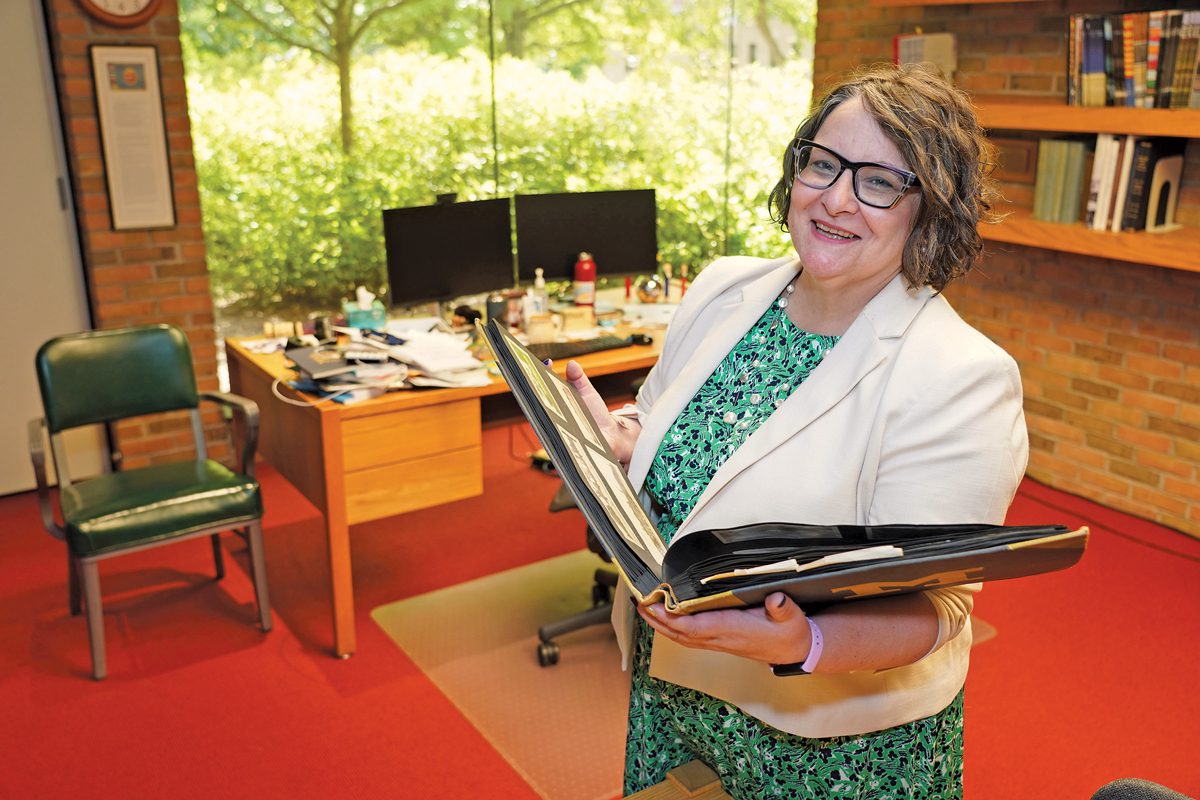
Photo by J. Adrian Wylie
A year and a half into her tenure-track teaching job, Alexis Antracoli decided to opt out. “It was a hard decision,” recalls Antracoli, now director of the U-M Bentley Historical Library. “Kind of scary.”
A Brandeis PhD in early American history, she had enjoyed teaching at tiny St. Francis University in Pennsylvania, but “the research could be pretty isolating,” she says, “and it just wasn’t my passion.”
Searching for something that was, she recalled how she’d enjoyed an undergraduate job at Boston College, working in the library’s special collections. She moved to Ann Arbor to enroll in the U-M’s School of Information, earning a master’s in 2011 with a concentration in archives, working part of the time as an assistant archivist at the Bentley. After jobs at Drexel University, Rutgers, and Princeton, she returned a year ago to run it.
The nearly ninety-year-old library on North Campus is named for Alvin Bentley, a U-M alum, regent, and congressman. The Bentley houses the university’s archives and others relevant to the state of Michigan. Its 11,000 collections include everything from records of U-M regents’ meetings dating back to 1837 to news clippings about alum Ted Kaczynski, aka the Unabomber.
The single most-in-demand collection is that of famed Detroit architect Albert Kahn. Also very popular are the papers of Michigan governors; recently, Rick Snyder’s arrived in an electronic file.
The pandemic sped up the Bentley’s digitization efforts, because with the library closed, or open for limited hours, users were asking for online information. But processing texts and photos is expensive and time-consuming. “The truth is everything will never be digitized,” says Antracoli. “There’s just too much of it.”
While digitization extends the collection’s reach, many users still thrill at holding original documents and photographs (with gloves). On a recent morning, Chicago retiree Isabelle Baird is reading letters written by her great-grandfather, John Baird, an alum who was the first director of what is now the Michigan Department of Natural Resources. She hopes to complete a memoir her father started. “I’m going to go through this box by box,” she says. “You get a sense of the person.”
Baird is one of half a dozen researchers in the spacious reading room, where a glass wall looks out on a courtyard. Each works at a small table topped with folders and boxes of material delivered by staff. (The storage areas are off-limits to visitors.)
At another table, New York freelance writer Rozina Ali reads the files of a former Detroit attorney for a planned book on Arab American activists in the 1960s. And Eimee Lagrama, a librarian from the University of the Philippines, is scrolling on her computer through listings of the library’s voluminous Philippines collection. Most of the materials were donated by U-M professors and alumni who lived or worked there from 1898 to 1946, when the islands were a U.S. colony.
Antracoli works nearby in a neat and spacious office. Friendly, direct, and even-toned, the director, forty-eight, does not wear her ambitions on her sleeve, but she’s focused and passionate about her goals. The most important, she says, is “to create a more inclusive collection.” At Drexel, she worked with a group called Archives for Black Lives; at Princeton, she led the library’s first diversity and inclusion group.
The daughter of a schoolteacher/principal and a homemaker, Antracoli reflects that her mother cared “about this thing called equity, though she might never have used the word.” But she herself “didn’t fit in very well” in their small California farming community. “It gave me some sense of what it is to be excluded,” Antracoli says.
She’s building on efforts begun under her predecessor, Terry McDonald. A historian and former dean of LS&A, McDonald initiated efforts like the African American Student Project, which spent years identifying Black U-M students from the nineteenth century through 1980.
Related: Diversity Deferred
Like academic libraries around the country, the Bentley has embraced what’s called “reparative” descriptions of its collections. While original source material is untouched, employees like Gideon Goodrich are updating terminology, changing folder labels or descriptors like “American Indian” or just “Indian” to “Native American” or “Indigenous.” Similarly, “colored” and “Negro” are replaced by “Black” or “African American.”
“Alexis is very, very approachable,” Goodrich says, “and I’ve had many conversations with her about the different ways we can approach reparative work.”
They “also want to avoid using euphemistic terminology,” Goodrich adds. “In Michigan, when people are describing Detroit or Dearborn or Flint, they might use terms like ‘urban’ … [as] code for usually Black neighborhoods, but also just poor neighborhoods.” Reading the documents carefully, they try to use the most accurate contemporary descriptors.
Updating terminology is just part of the effort. Antracoli recently won a grant from the university to encourage Native American groups in the state to use and contribute to the Bentley collection.
“We’ve started working with a consultant to help us identify records about tribal communities,” she says, “especially those that are particularly culturally sensitive.”
She’d also like to draw more nonacademics into the archival world, which McDonald says can be intimidating. “I can’t tell you how many people I’ve met on the street who said, ‘I’ve always wanted to go there. Can anyone go?’”
Related: Archivists’ Dilemma
To show that anyone can, Antracoli’s staff organized a well-attended event last spring, where attendees learned how to use source materials to research the history of their homes. Future efforts “to be more welcoming,” she says, could include adding “evening or weekend hours for people who might not be able to come during the day.” Other initiatives could “include public tour offerings, an open house focused on local African American history, and fellowship programs aimed at K–12 teachers and artists.”
Looking back on her own change of academic direction, Antracoli says, “I have no regrets. This is a much better fit for me.”